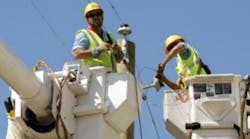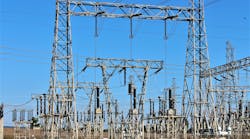ComEd has submitted to the Illinois Commerce Commission data showing that the 2011 Smart Grid law created more than 2400 full-time equivalent jobs in Illinois in 2012. These include direct jobs at ComEd, contractors and induced full-time equivalent positions representing a broad range of functions required to build a 21st century electric grid, from construction, engineering and system design to manufacturing and administration.
ComEd's Energy Infrastructure Modernization Act Annual Jobs Creation Report, one of two reports ComEd filed, shows that the grid modernization programs authorized by the 2011 Smart Grid law created 785 direct and contractor full-time equivalent jobs, including positions at the utility and outside contractors, along with an estimated 1,700 induced jobs created from the ripple effect of the $165 million in capital spending on grid modernization programs last year. The ripple effect is particularly strong in the Chicago area and provides benefits beyond the direct spend. Induced jobs were calculated by the Regional Economic Applications Laboratory (REAL) at the University of Illinois. REAL uses a model for the Chicago area economy that shows for every direct and contractor job added, an additional two jobs are created elsewhere in the economy.
"Our work to bring the electric grid into the 21st century created more new jobs than we anticipated in the first year of the program," said Anne Pramaggiore, president and CEO, ComEd. "As the legislature intended, ComEd is making a positive economic impact as we improve service to our customers and modernize our grid to help keep Illinois competitive."
Under the Smart Grid law, ComEd committed to spend $2.6 billion over 10 years to modernize the electric grid in Northern Illinois, over $1.3 billion of which is earmarked to deploy a Smart Grid system and install smart meters in 4 million homes and businesses. In ComEd's first rate case under the law, the ICC's interpretation of the law reduced funding by nearly $100 million per year beginning in 2014 and beyond. As a result, ComEd had to postpone deployment of key initiatives, including the installation of smart meters, until 2015. Both the Illinois House and Senate passed legislation to get the Smart Grid back on track. If this legislation is enacted in the spring legislative session, ComEd will be able to accelerate its meter installations to begin later in 2013. ComEd reiterated that commitment in the 2013 Annual Implementation Progress Report covering advanced meters, also filed today.
"The grid modernization programs are putting many linemen, electricians and specialists who work on our electric grid back to work in well-paying, skilled jobs. This helps the Illinois economy and boosts other local industries, too," said Michael Carrigan, president, Illinois AFL-CIO. "Getting the programs back on track will protect and increase jobs for Illinois workers."
ComEd's grid modernization investments have provided an important boost to Illinois manufacturers, suppliers and service providers with the expertise necessary to support the electrical system upgrade. Last year, ComEd awarded grid modernization contracts worth a total of $118 million, including 71 percent to Illinois companies providing services and products from engineering to cable to smart switches. Of the total, $54 million, or 46 percent, was spent with diverse suppliers.
ComEd is partnering with a number of established Chicago-area companies and attracting new businesses to the region. Local partners include Meade Electric, S&C Electric, G&W Electric, Intren and Aldridge. Growing Chicago-based entrepreneurial firms, such as PMI Energy Solutions and electrical contractor MZI Group, are expanding their Illinois operations as a result of the grid modernization program. Choctaw-Kaul, a Native American-owned distributor of safety products, opened a new distribution center near Midway airport to support the program.
Getting the full smart meter deployment back on track will provide the needed incentive for major companies to proceed with previously announced expansion plans, including General Electric, which would manufacture smart meters in Chicago. Silver Spring Networks, a Silicon Valley-based provider of communications equipment for smart grid systems, also plans on establishing operations in Chicago to support the smart meter deployment. Both companies have put their local expansion plans on hold pending a resolution on the smart meter installation timeline.
The 2013 Annual Implementation Progress Report also addresses potential ways to accelerate the smart meter deployment, as the Illinois Commerce Commission requested. ComEd evaluated two options, both of which would begin smart meter rollout in 2013. The preferred option would significantly accelerate the smart meter rollout from the original plan that would have delayed smart meter installations until 2015. Both proposals would require significant additional capital expenditures in the near term above and beyond the funding available for that purpose. The new legislation, if enacted this spring, would provide that funding.


